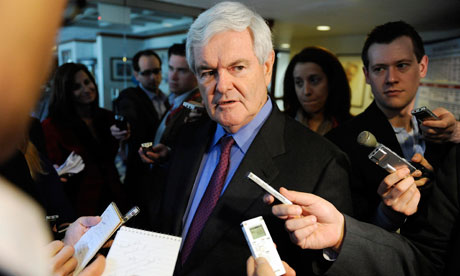
One current load of excited hype belongs to Murdoch's the Daily, coming to iPads around Europe and the UK before midsummer's day according to Rupert Hints Inc. But since we don't really know how this tablet tabloid is doing in America yet – and may begin to grow pensive over some reader reviews and alleged retention figures – perhaps the prize for the most significant digital launch of the year so far properly belongs to the paywall at New York Times…
No, sorry. Expert observers – like the editor of the Guardian – think there's nil chance of a "general interest newspaper" being able to charge decent access rates for online content. (We'll see if that includes the promised UK edition of the Huffington Post.) So maybe we need a third contender: Politico 2012. And if you want a glimpse of profitable news things to come, log on and see for yourself.
The mothership Politico.com was launched in Arlington, Virginia, four years ago by a couple of bright, very experienced Washington Post correspondents who simultaneously started a website, a video service for TV and a print newspaper for Capitol Hill, reporting politics in professional depth – not as part of some greater general coverage but rather in the way that the Financial Times (for instance) does investment. Politico is the embryo FT of politics – profitable and growing from year one.
And now Politico 2012 takes that a step further. If you're running for president next year (or running for almost anything else, for that matter) this is your one-stop emporium for relentless facts and obsessive detail: speaking and meeting schedules for anyone who aspires to an Oval Office challenge, polls dissected, policy briefs by the dozen, punditry by the yard. Where's Newt Gingrich going tomorrow? Where was Chris Christie yesterday?
This isn't news that an all-purpose newspaper would pause over. This is Nerd Central for candidates, spin doctors, academics, other journalists. This is the political equivalent of pink pages of share prices in the FT – and a neatly assembled audience for advertisers who want to reach movers and shakers behind their office doors. It needs the accuracy and reputation of journalism to underpin credibility, but it also needs the infinite capacity for facts and fast change that the internet can provide.
And if that's true in Washington – with the real prospect of paid-for access and good money ahead – why leave it on the other side of the Atlantic? Isn't there a market for Westminster day by day at inordinate depth? Isn't there, in particular, a Brussels-based European market, too?
Europe's 27 nations struggle constantly to share news that unites them and rival opinions they must keep abreast of. There's no free market in vital information. The Guardian tried to start one in print almost two decades ago, creating a network of translated European views that involved major papers across the continent; but Guardian Europe didn't survive sterling's exchange rate mechanism debacle for long. Now, splendidly, the idea is back as a special web launch involving Der Spiegel, El País, Gazeta Wyborcza and Le Monde. You can, from day one, see a concept given fresh force on the net.
But can you also, looking at what the Arlington gang has achieved, see something beyond that? News at a price that a select, but vitally influential, few must have. News behind a wall of profit that helps shape our future. News beyond stocks and shares that, at last, makes money.

